Imagine a computer capable of solving problems in minutes that would take even the most powerful classical supercomputers centuries. This is the awe-inspiring promise of Quantum Computing, a revolutionary technology poised to change how we process information fundamentally.
While still in its early stages, quantum computing has already garnered significant attention due to its potential to tackle previously intractable challenges. The global market for this technology is expected to reach a staggering USD 5.3 billion by 2029, reflecting its immense potential.
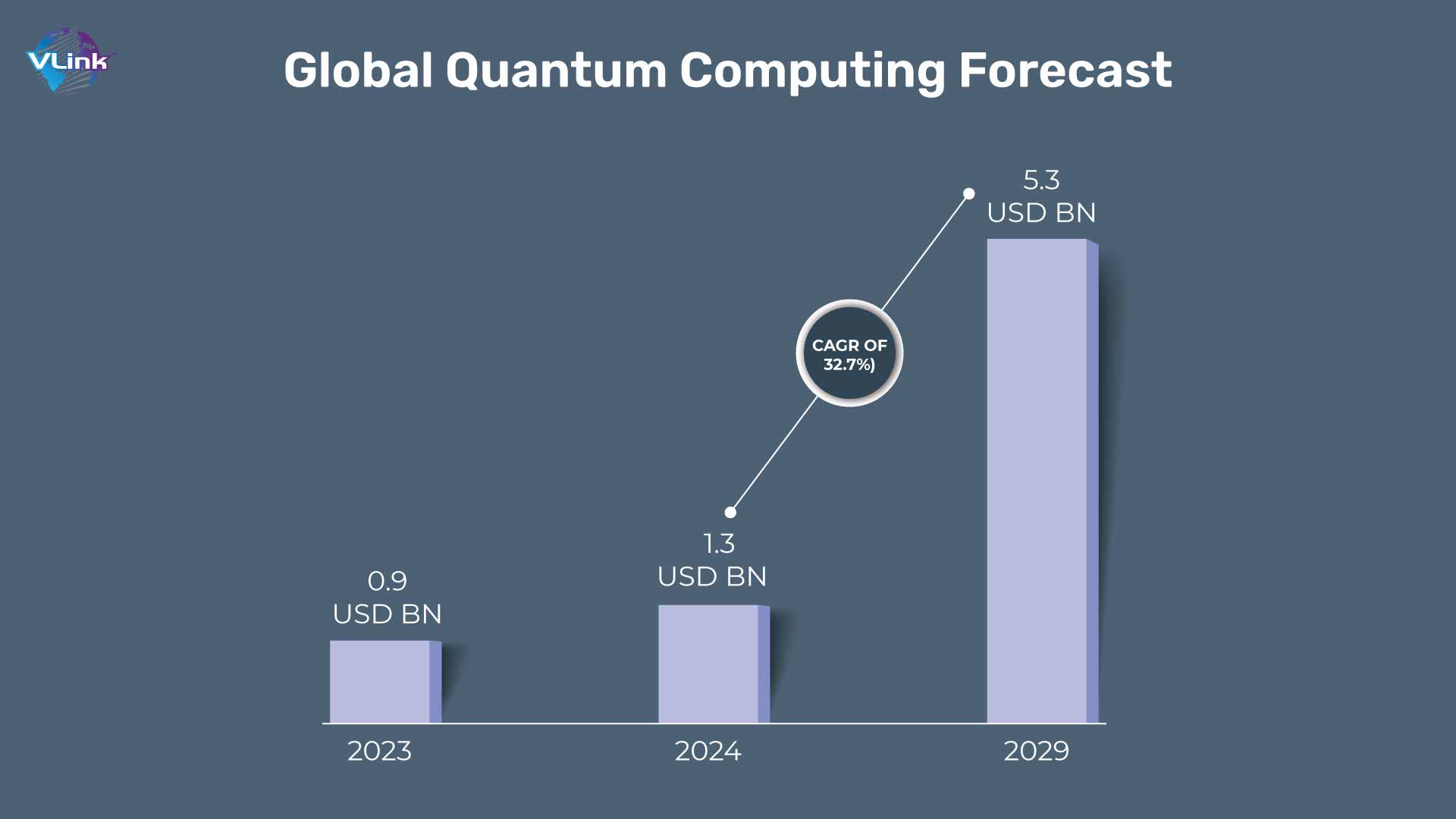
But what makes quantum computing so unique?
Unlike traditional computers that rely on bits that can be either 0 or 1, quantum computers harness the principles of quantum mechanics to utilize qubits. These qubits can exist in a superposition state, meaning they can be both 0 and 1 simultaneously. This ability and other quantum phenomena like entanglement and interference allow quantum computers to explore vast possibilities concurrently, leading to exponential speedups in specific computations.
This is not just science fiction; it's the dawn of a new era in computing. While challenges remain in scalability and error correction, the rapid advancements in quantum hardware and software development pave the way for a future where quantum computers will become powerful tools, pushing the boundaries of scientific discovery and technological innovation. The complexity and potential of quantum computing are truly intriguing and hold great promise for the future.
This blog delves deeper into the intricacies of quantum computing, exploring its principles, components, applications, and potential impact on various industries. From healthcare to finance, quantum computing has the potential to revolutionize the way we solve complex problems. Get ready to embark on a journey into the fascinating world of quantum mechanics and discover how this technology is poised to shape the future.
What is Quantum Computing & Its Principles?
Traditional computers operate on bits, which can be either 0 or 1. Quantum computers leverage the principles of quantum mechanics, where qubits exist in a superposition state, meaning they can be 0, 1, or both simultaneously. This unique ability, along with two other quantum phenomena—entanglement and interference—empowers quantum computers to solve specific problems exponentially faster than classical computers.
Here's a breakdown of these fundamental principles:
- Superposition: Think of flipping a coin that doesn't just land on heads or tails but can be both simultaneously. This is the essence of superposition in quantum computing. Qubits can exist in a combination of 0 and 1 states until measured, allowing them to explore multiple possibilities concurrently.
- Entanglement: This phenomenon creates a special connection between qubits, even when physically separated. It's like having two coins that always land on the same side, no matter how far apart. Measuring one entangled qubit instantly determines the state of the other, regardless of distance. This interconnectedness enables parallel processing across multiple qubits, accelerating computations.
- Quantum Interference: When multiple possibilities (waves) for a qubit's state overlap, they can either amplify or cancel each other out. It's like when two waves in a pond meet; they can either make a bigger wave or disappear. This phenomenon allows quantum algorithms to exploit constructive interference to find solutions efficiently.
By harnessing these principles, quantum computers can tackle problems that would take classical computers years, if not centuries, to solve.
Components of a Quantum Computer
The core component of a quantum computer is the qubit. Qubits can be formed from various physical systems, including:
- Trapped Ions: Ions are held in place using electromagnetic fields and manipulated with lasers. They offer long coherence times (stability) but require complex setups.
- Superconducting Circuits: Qubits are formed by manipulating the electrical currents flowing through superconducting loops. This technology is scalable and relatively inexpensive, making it a popular choice.
- Photons: Light particles offer long coherence times and can be easily transmitted over long distances. Building scalable photonic quantum computers presents technical challenges.
Quantum computers also require:
- Control Systems: These systems use precise electrical pulses, lasers, or magnetic fields to manipulate the qubits and implement quantum algorithms.
- Measurement Systems: Measuring the final state of the qubits determines the computational result. This often involves specialized detectors that are sensitive to the delicate quantum states.
Building a functional quantum computer requires integrating these components seamlessly and maintaining the delicate quantum states of the qubits.
How does a Quantum Computer work?
While the specific workings of a quantum computer are complex, the basic principle involves manipulating qubits in a controlled manner to exploit superposition and entanglement. Here's a simplified explanation:
- Initializing Qubits: Preparing the qubits in a specific state, often a superposition of 0 and 1.
- Applying Quantum Gates: These act like logical operations in classical computers but operate on qubits in their superposition states. Gates manipulate the qubits according to the specific quantum algorithm being implemented.
- Entanglement: Creating correlations between qubits allows them to influence each other, enabling parallel processing across multiple qubits.
- Measurement: Reading the final state of the qubits to obtain the computational result. This measurement often collapses the superposition, meaning the qubit loses its ability to be in multiple states simultaneously.
The specific sequence of these steps varies depending on the quantum algorithm being executed. The core principle remains the same: harnessing the unique properties of qubits to solve problems in ways that are intractable for classical computers.
Why do we need Quantum Computers?
Classical computers struggle with problems involving many variables or require simulating complex systems. These problems often involve vast search spaces, where exploring all possibilities becomes exponentially time-consuming. With their ability to explore multiple possibilities simultaneously, Quantum computers can tackle such issues with unprecedented speed and efficiency, making their potential impact tangible and significant.
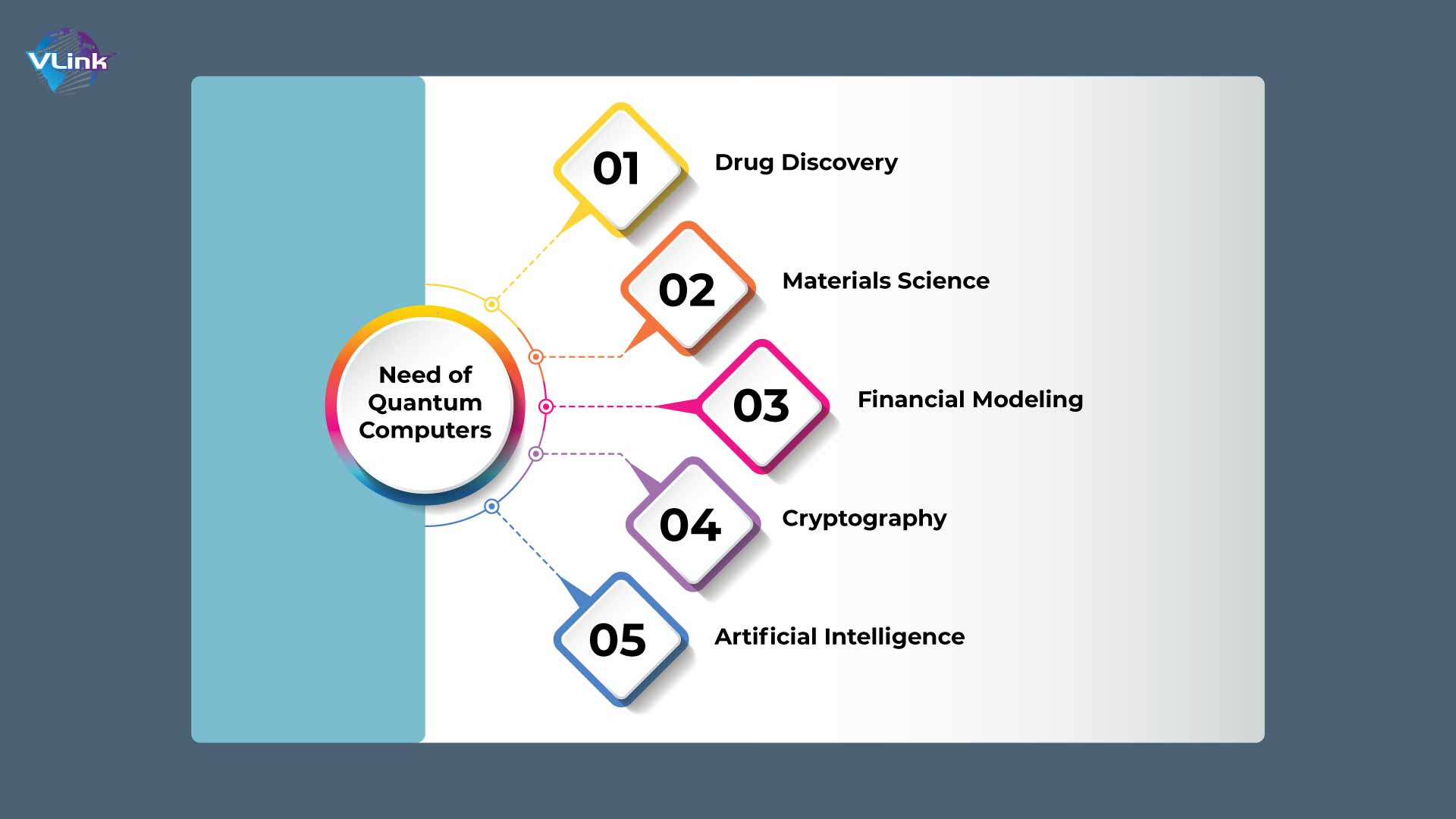
Here are some specific examples:
- Drug Discovery: Simulating complex molecular interactions to design new drugs and materials with desired properties. This can significantly accelerate drug development and lead to more effective treatments.
- Materials Science: Discovering new materials with tailored properties for applications like batteries, solar cells, and superconductors. Quantum simulations can reveal material properties that are difficult or impossible to predict with classical methods.
- Financial Modeling: Imagine a world where managing risk and identifying potential market trends is manageable. Quantum algorithms can analyze vast economic data and identify complex patterns beyond classical computers' reach. This could revolutionize the financial industry, making it more efficient and less prone to market fluctuations.
- Cryptography: Breaking current encryption methods and developing new, quantum-resistant ones. While this poses a potential security threat, it also necessitates the development of new, secure communication protocols.
- Artificial Intelligence: Training machine learning models more efficiently. Quantum algorithms can accelerate the training process and enable the development of more powerful AI models.
These are just a few examples of how quantum computers can address problems currently intractable or computationally expensive for classical computers. It's important to note that these applications are primarily in the research and development phase. As quantum computers become more powerful and accessible, their use will expand into various industries.
How Can You Get Started with Quantum Computing?
Several resources are available for those interested in exploring the world of quantum computing:
- Online Courses: Platforms like Coursera, edX, and Udacity offer introductory and advanced courses on quantum computing.
- Quantum Software Development Kits (SDKs): Companies like IBM, Microsoft, and Google provide open-source SDKs and cloud access to their quantum computers for experimentation.
- Books and Articles: Numerous publications delve deeper into the theoretical and practical aspects of quantum computing.
While building and operating your quantum computer is beyond most individuals' reach, these resources offer valuable insights and opportunities to experiment with this nascent technology.
Advantages of Quantum Computing
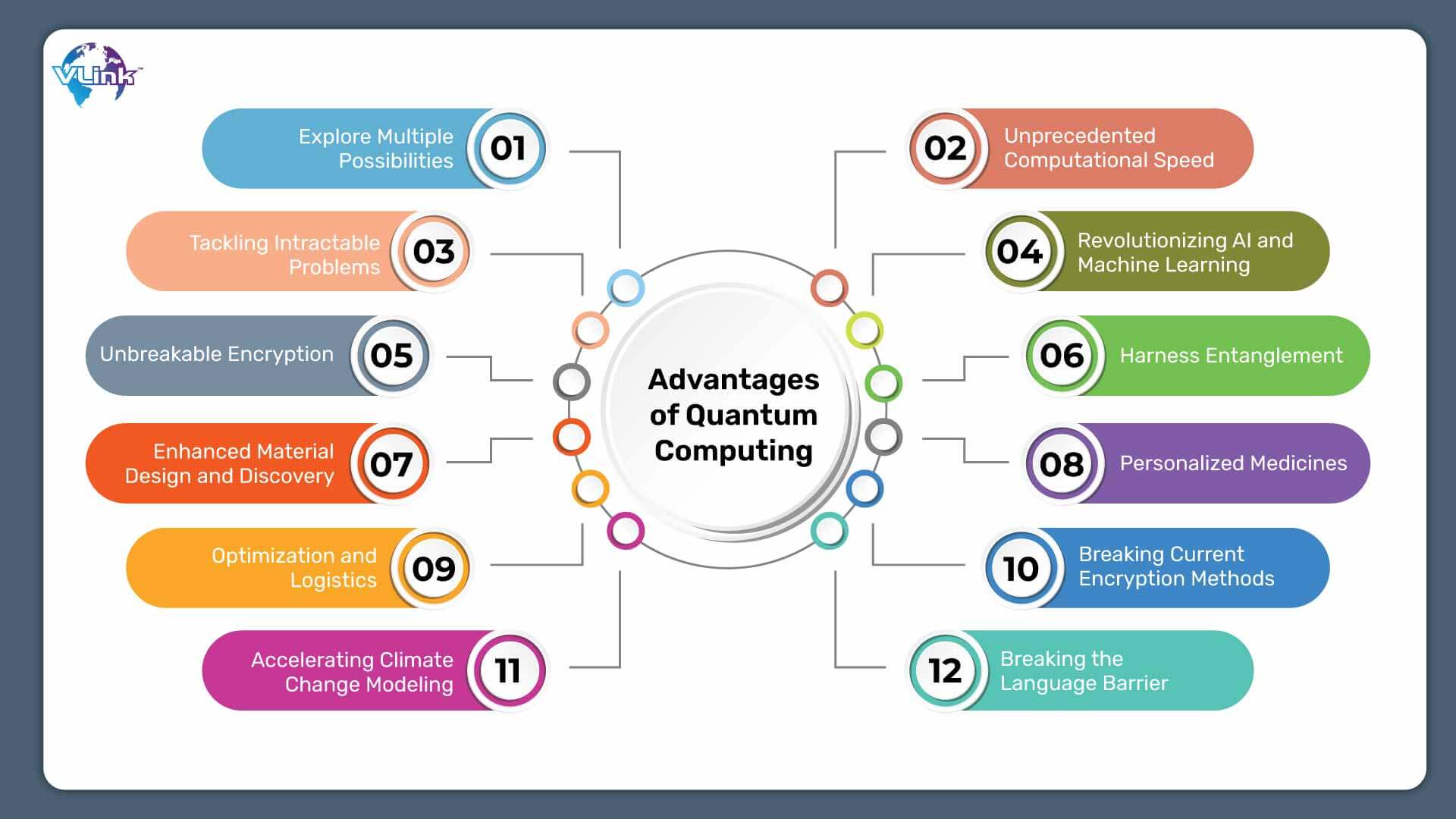
Quantum computing is rapidly emerging as a revolutionary technology with the potential to tackle problems beyond the reach of traditional computers. Here's a glimpse into the remarkable advantages it offers:
- Explore Multiple Possibilities:
Superposition allows quantum computers to examine exponentially more solutions simultaneously. This is particularly beneficial for problems involving vast search spaces, where classical computers would require an impractical amount of time to explore all possibilities.
- Unprecedented Computational Speed:
Imagine calculations that would take classical computers years, even centuries, being completed in minutes or seconds. This mind-bending speedup arises from the unique ability of quantum computers to harness the principles of quantum mechanics. They can explore multiple possibilities simultaneously, exponentially accelerating problem-solving capabilities.
- Tackling Intractable Problems:
Certain problems, like simulating complex molecules or optimizing logistics networks, must be more complex for classical computers. Quantum computers, however, can navigate these complexities with ease. This opens doors to materials science, drug discovery, and financial modeling breakthroughs.
- Revolutionizing AI and Machine Learning:
Quantum algorithms can significantly enhance machine learning processes, leading to powerful machine learning and AI development. This can potentially revolutionize various fields, from personalized medicine to autonomous vehicles.
- Unbreakable Encryption:
While some might view it as a concern, quantum computers also possess the ability to break current encryption methods. This necessitates the development of new, quantum-resistant cryptography, ensuring the continued security of sensitive information.
- Harness Entanglement:
Correlated qubits can share information instantly, enabling parallel processing across multiple qubits. This significantly accelerates computations for specific algorithms that can leverage this entanglement.
- Enhanced Material Design and Discovery:
Quantum computers make simulating the behavior of molecules and materials at the atomic level easy. This opens the door to designing new materials with specific properties, leading to breakthroughs like superconductors, batteries, and lightweight yet strong alloys.
- Personalized Medicines:
Quantum algorithms can analyze vast genetic and molecular information datasets, paving the way for personalized medicine and the development of more effective drugs with fewer side effects.
- Optimization and Logistics:
Quantum computers can efficiently optimize complex systems like supply chains and logistics networks, reducing costs significantly and improving resource allocation.
- Breaking Current Encryption Methods:
While a potential concern, the ability to break current encryption methods also necessitates the development of new, quantum-resistant cryptography. This ensures the continued security of sensitive information in the quantum age.
- Accelerating Climate Change Modeling:
Quantum computers can model complex climate systems with much higher accuracy, leading to more precise predictions and better-informed climate change mitigation strategies.
- Breaking the Language Barrier:
Quantum algorithms can revolutionize machine translation, potentially breaking the language barrier and fostering more excellent global communication.
It's crucial to know that quantum computers are not entirely intended to replace classical computers. Instead, they are envisioned as specialized tools for tackling problems intractable for classical computers.
Note:- Remember, these are just a few examples. As quantum computing continues to evolve, its potential applications and advantages will expand further, shaping the future of various scientific and technological fields.
Challenges of Quantum Computing
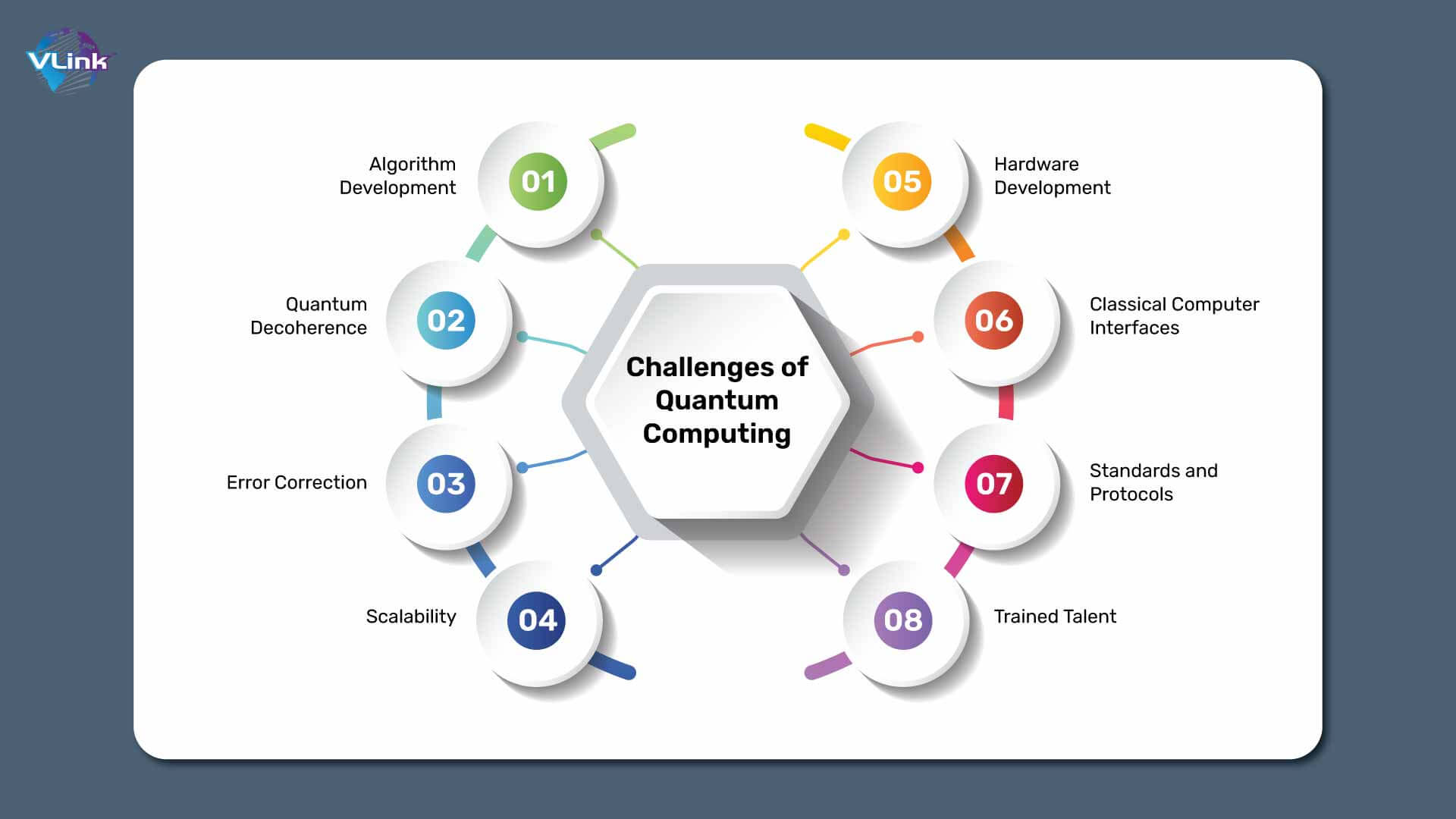
Despite its immense potential, quantum computing faces several challenges:
- Algorithm Development:
Designing efficient quantum algorithms for specific problems is an ongoing research area. While some powerful algorithms exist, developing algorithms that fully exploit the potential of quantum computers remains a challenge.
- Quantum Decoherence:
The Achilles' heel of quantum systems is their fragility. Qubits, the building blocks of quantum computers, are incredibly sensitive to their environment. Even the slightest environmental noise can cause them to lose their unique quantum properties, a phenomenon known as decoherence. This significantly limits the time quantum information can be manipulated and stored, posing a major obstacle to reliable computation.
- Error Correction:
Quantum computations are inherently prone to errors due to the delicate nature of qubits. Implementing effective error correction techniques is crucial to ensuring the accuracy and reliability of calculations. This requires sophisticated algorithms and hardware, making it a significant research focus in the field.
- Scalability:
Current quantum computers operate on a much smaller scale compared to their classical counterparts. Building and maintaining large-scale quantum systems with thousands of qubits remains a significant challenge. This scalability issue hinders the ability to tackle problems requiring immense computational power.
- Hardware Development:
Constructing reliable and high-quality quantum hardware is a complex and expensive endeavor. Researchers must overcome hurdles such as creating stable qubits, controlling electronics, and maintaining a noise-free environment.
- Classical Computer Interfaces:
Integrating quantum computers seamlessly with existing classical computing systems is crucial for practical applications. Efficient data transfer and communication protocols must be developed to bridge the gap between these two distinct computing worlds.
- Standards and Protocols:
Establishing standardized protocols and communication methods will be crucial for widespread adoption and collaboration as quantum computing matures. This will ensure compatibility and interoperability between different quantum systems.
- Trained Talent:
The field of quantum computing demands a unique skill set, combining expertise in physics, computer science, and engineering. Building a robust workforce with the necessary knowledge and expertise remains a challenge.
Despite these challenges, researchers across the globe are actively working on overcoming these obstacles. With continued advancements, quantum computing has the potential to revolutionize various fields, ushering in a new era of scientific discovery and problem-solving.
How do companies use Quantum Computing?
Major tech companies like IBM, Google, Microsoft, and Amazon actively invest in quantum computing research and development, building their own quantum hardware and software platforms. Additionally, several startups and research institutions contribute to the field's advancement.
Here are some ways companies are currently utilizing quantum computing:
- Research and Development: Companies use quantum computers to simulate complex systems in materials science, drug discovery, and financial modeling. This allows them to explore new possibilities and accelerate research efforts.
- Optimization Problems: Quantum algorithms are being explored to optimize logistics and supply chain management, improve efficiency, and reduce costs.
- Machine Learning: Companies are investigating the potential of quantum machine learning for tasks like pattern recognition and natural language processing, aiming to develop more powerful models.
While widespread commercial applications are still early, companies actively explore quantum computing's potential to gain a competitive edge in various industries.
Some Potential Business Use Cases for Quantum Computers
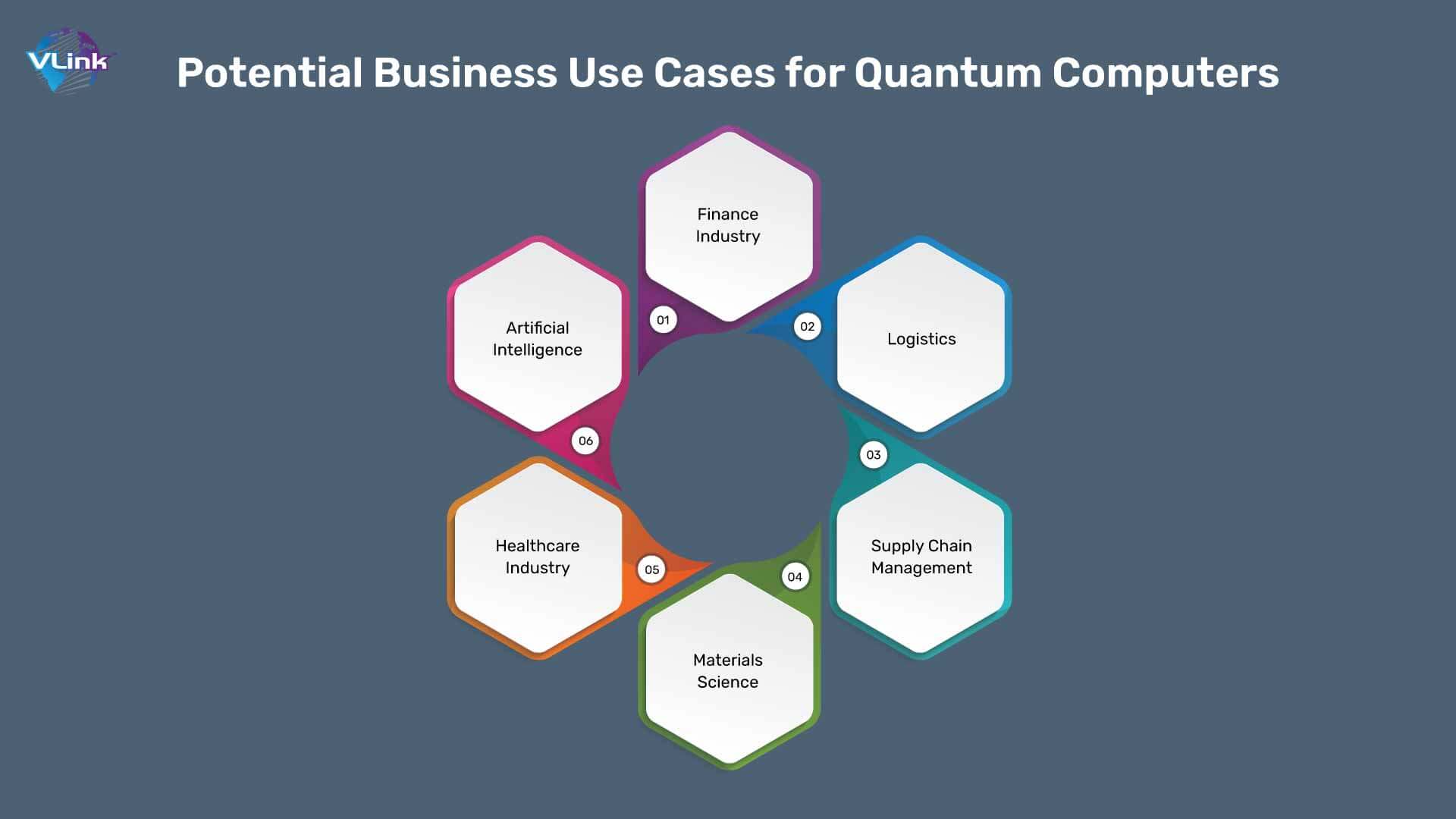
Several industries stand to benefit significantly from the advancements in quantum computing:
- Finance Industry: Optimizing portfolio management, risk analysis, and fraud detection. Quantum algorithms can analyze vast financial datasets and identify patterns that are difficult to detect with classical methods.
- Logistics and Supply Chain Management: Optimizing delivery routes and inventory management. Quantum algorithms can efficiently solve complex optimization problems, improving efficiency and reducing costs.
- Materials Science: Discovering new materials with desired properties for applications like batteries and solar cells. Quantum simulations can reveal material properties that are difficult or impossible to predict with classical methods.
- Healthcare Industry: Quantum simulations can accelerate the development of new drugs and materials by modeling complex molecular interactions and identifying potential drug candidates more efficiently.
- Artificial Intelligence: It involves training machine learning models more efficiently and tackling complex problems like natural language processing and image recognition. Quantum algorithms can accelerate the training process and enable the development of more powerful AI models.
These are just a few examples of potential business use cases for quantum computing. As technology matures, its applications are expected to expand, transforming various industries and creating new opportunities.
Note:- These industries are likely to be early adopters; the potential benefits of quantum computing extend across various sectors, including logistics, aerospace, and energy.
What are the other quantum technologies aside from computing?
Beyond computing, other quantum technologies are being explored with significant potential:
- Quantum Communication: Securely transmitting information using quantum principles, making it unbreakable by classical computers. This technology has the potential to revolutionize communication security and privacy.
- Quantum Sensing: Developing susceptible sensors for medical imaging, navigation, and environmental monitoring applications. Quantum sensors can detect undetectable minute changes with classical methods, leading to breakthroughs in various fields.
- Quantum Imaging: Capturing images with unprecedented resolution and detail, potentially revolutionizing microscopy and medical diagnostics. This technology can reveal new insights into biological processes and material properties.
These are just a few examples of the diverse range of quantum technologies being explored. Each area holds immense potential for breakthrough applications across various fields.
Future of Quantum Computing
The future of quantum computing is brimming with possibilities. While challenges remain, significant progress is being made in qubit stability, scalability, and algorithm development. As these hurdles are overcome, quantum computers are expected to:
Intractable problem solution: - Solve previously intractable problems in various fields, leading to scientific discovery and technological innovation breakthroughs. This includes:
- Designing new materials with tailored properties for applications like superconductors and ultra-efficient solar cells.
- Simulating complex biological systems to develop new drugs and personalized medicine approaches.
- Optimizing financial models and managing risk with unprecedented accuracy.
- Breaking current encryption methods and developing new, quantum-resistant ones.
Shift in computational thinking: A shift in computational thinking is required, and specialized software and algorithms must be developed to harness their potential fully. This involves:
- Designing new quantum algorithms tailored to specific problems.
- Developing error correction techniques to maintain the delicate quantum states of qubits.
- Building robust quantum software platforms and programming languages.
Transition to Fault-Tolerant Quantum Computers: Current quantum computers are prone to errors due to the delicate nature of manipulating quantum states. However, the future lies in developing fault-tolerant quantum computers, where errors are automatically detected and corrected, leading to significantly more reliable and robust machines.
Hybrid Computing: Classical and Quantum Collaboration: The future likely holds a hybrid computing landscape where classical and quantum computers work together. Classical computers will handle tasks best suited to their strengths, while quantum computers tackle computationally intractable problems. This collaboration will unlock even more significant potential.
Quantum Supremacy and Beyond: Quantum supremacy, where a quantum computer demonstrably outperforms a classical computer on a specific task, is a significant milestone. Beyond this, we can expect quantum computers to tackle increasingly complex problems, leading to breakthroughs in various fields.
Democratization of Quantum Computing: While limited to research institutions and large corporations, quantum computing is expected to become more accessible. Cloud-based platforms and user-friendly interfaces will allow broader participation, accelerating innovation.
Evolving Quantum Algorithms and Software Development: As quantum computing matures, developing new algorithms and software designed explicitly for this paradigm will be crucial. This will unlock the technology's full potential and enable the creation of groundbreaking applications.
A New Era of Scientific Discovery: From materials science to medicine, quantum computing has the potential to revolutionize various scientific fields. Its ability to model complex systems with unprecedented accuracy will lead to groundbreaking discoveries across diverse disciplines.
The future of quantum computing is undoubtedly bright. As technology continues to evolve, its impact on various aspects of our lives will likely be profound, ushering in a new era of scientific and technological advancement.
Why Choose VLink for Quantum Computing Services?
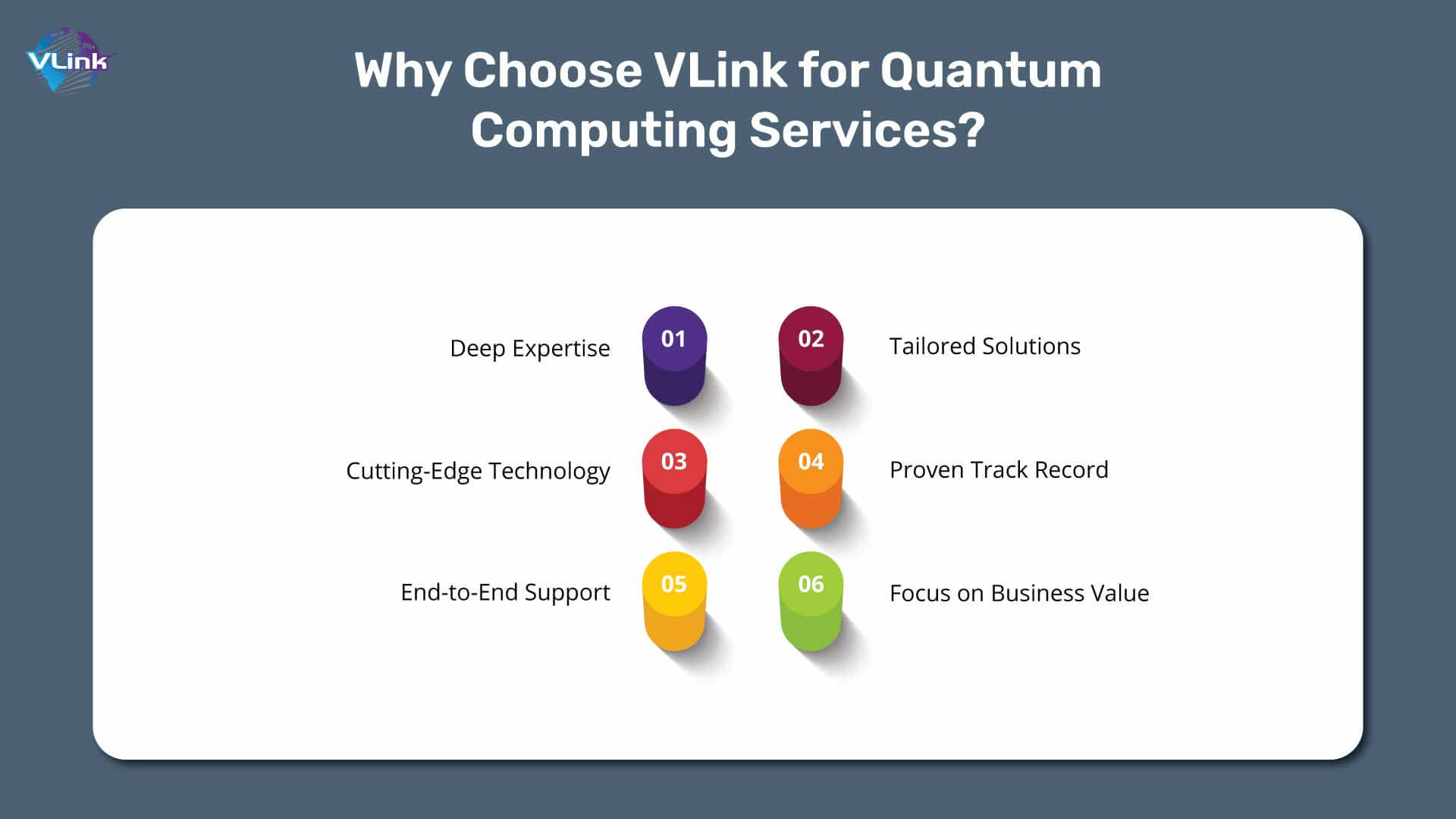
Venturing into the realm of quantum computing can be a daunting task. But with VLink as your trusted partner, you gain a team of experts dedicated to guiding you through this transformative technology and unlocking its immense potential for your organization. Here's why VLink stands out:
- Deep Expertise: Our team comprises leading quantum computing professionals with a profound understanding of the technology, its applications, and the intricate challenges involved.
- Tailored Solutions: We believe in a collaborative approach. We work closely with you to comprehend your needs and goals, crafting a customized quantum computing solution that delivers the most impactful results for your unique situation.
- Cutting-Edge Technology: We stay at the forefront of the ever-evolving quantum computing landscape. You gain access to the latest advancements in hardware and software, ensuring you leverage the most powerful tools available.
- Proven Track Record: We have a successful history of collaborating with leading organizations across diverse industries. Our proven ability to deliver tangible results through quantum computing speaks volumes about our expertise.
- End-to-End Support: We don't just provide technology; we provide a comprehensive partnership. Our dedicated team offers unwavering support throughout your quantum computing journey, from initial ideation to algorithm development, implementation, and ongoing optimization.
- Focus on Business Value: We go beyond simply offering technological solutions. We help you translate quantum computing's potential into concrete business advantages and measurable outcomes, ensuring a tangible return on your investment.
By choosing VLink, you gain more than just a quantum computing service provider. You gain a trusted partner with the expertise, technology, and unwavering commitment to guide you on your quantum journey and unlock the potential to revolutionize your industry. Contact us now!
Wrapping Up!
Quantum computing represents a paradigm shift in computing, offering unparalleled potential to tackle some of humanity's most pressing challenges. While still in its nascent stages, the ongoing research and development efforts hold immense promise for revolutionizing various sectors and shaping the future of technology. As the field matures, quantum computers are poised to become powerful tools, pushing the boundaries of scientific discovery and technological innovation.
Despite some challenges, quantum computing's potential benefits are undeniable. By fostering collaboration between researchers, developers, and industry leaders, we can accelerate the development of this transformative technology and unlock its vast potential for a brighter future.
Frequently Asked Questions
Quantum computing leverages the principles of quantum mechanics to solve problems intractable for classical computers. Unlike classical bits, Qubits can exist in a state of superposition (both 0 and 1 simultaneously), enabling parallel processing and exponential speedups for specific algorithms.
Classical computers struggle with vast search spaces and complex simulations. Quantum computers, however, can tackle these problems with unprecedented efficiency, allowing them to explore multiple possibilities concurrently, leading to breakthroughs in drug discovery, materials science, financial modeling, and more.
While still in their early stages, quantum computers are being explored for drug discovery, materials science, financial modeling, cryptography, and training machine learning models. As the technology matures, its applications are expected to expand significantly.
Maintaining the delicate quantum states of qubits (which are prone to errors), achieving large-scale quantum computers with millions of stable qubits, and developing efficient quantum algorithms remain significant challenges.
Quantum computing holds immense potential to revolutionize various fields. As advancements overcome current hurdles, quantum computers are poised to become powerful tools for scientific discovery and technological innovation, shaping the future of our world.








